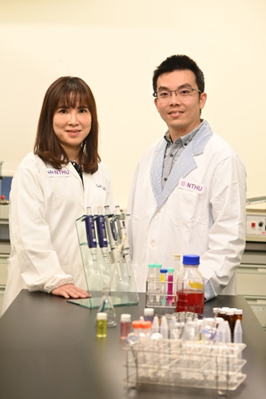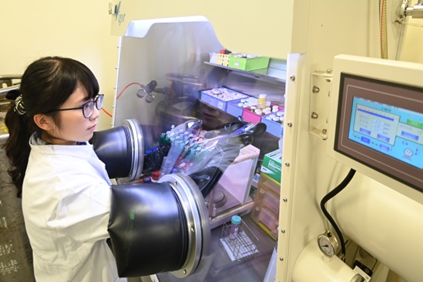New Cancer Treatment Developed at NTHU
2020.01.16
A research team led by Associate Prof. Chen Yunching and Assistant Prof. Lu Tsai-te of the Institute of Biomedical Engineering have recently developed a new treatment for cancer, in which blood vessels with malignant tumors are normalized by injecting a specially developed nanometer nitric oxide carrier, which also facilitates the movement of cancer drugs and immunocytes into the tumor. Their groundbreaking research has recently been published in the prestigious journal Nature Nanotechnology.
Chen likens the organs of the human body to a city, and cancer cells to a gang of ruffians occupying a particular neighborhood. Releasing angiogenesis factors causes the surrounding blood vessels to provide self-expanding nutrients, resulting in normal hypoxic necrosis of the cancer cells. The forms of cancer treatment currently in use, such as chemotherapy and target drugs, mainly work by killing the cancer cells or tumorous blood vessels, but cause abnormalities in the functions and structure of the blood vessels; moreover, if any of the cancer cells survive the treatment, they become recalcitrant, like hardened ruffians, increasing the chances of a relapse or metastasis.
What makes this innovative treatment especially interesting is its use of angiogenesis factors, which have hitherto been regarded as accomplices of cancer cells. Chen explained that after the tumorous blood vessels are normalized, they can help to enhance the function of anti-cancer drugs and immune cells.
It was while considering ways to counteract tumorous blood vessels that Chen approached Lu. Lu said that nitric oxide expands blood vessels and promotes blood circulation, and is thus used to treat such conditions as myocardial infarction and pulmonary hypertension. However, because nitric oxide can effectively transport molecules only for a short time, it is mostly used to treat acute symptoms, and is ineffective for chronic diseases like cancer.
Thus the research team developed a polymer nano-carrier consisting of lactic acid and glycolic acid to stabilize the bionic dinitroso iron complex that releases nitric oxide, thereby extending the time in which nitric oxide molecules are effectively released from a few minutes to several days, allowing them to accumulate in tumorous tissues, and restoring the abnormal blood vessels to normal. At this point, cancer drugs and immune cells can move straight into the tumor, destroying the cancer cells in one fell swoop.
Immunotherapy has become a leading topic in cancer treatment research in recent years, but getting the immunocytes to the location of the cancer cells has been problematic. Chen said that her team has already used nitric oxide nanocarriers combined with immunocyte therapy to eliminate liver tumors in mice.
Lu said that the new nitric oxide nanocarrier he has developed can be easily synthesized in three steps, and the dosage form can be completed in one step, making it suitable for mass production. He has already applied for patents in Taiwan and the US for his nitric oxide nanocarrier, and the team is currently investigating the possibilities to cooperate with domestic hospitals and pharmaceutical companies.

Prof. Chen & Prof. Lu have jointly developed a new treatment for cancer.

NTHU’s research team is the first one successfully used nitric oxide to normalized the tumorous blood vessel.
visited:
